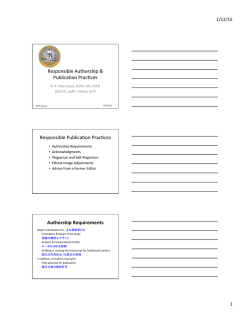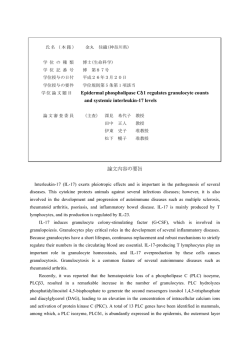
Type-2 cytokine-producing innate cells and IgE
(様式1) 学友会セミナー 申請日: 平成 26 年 6 月 2 日(月) 開催日時:平成 26 年 7 月 1 日(火) 11:00 ~ 12:00 開催場所:1 号館 2 階会議室 講師: Dr. Yui-Hsi Wang 所属・職名:Cincinnati Children's Hospital Medical Center, Assistant Professor 国名:U.S.A. 演題:Type-2 cytokine-producing innate cells and IgE-mediated food allergy 概要: IgE-mediated food allergy is manifested by an overactive T-helper 2 immune response to dietary antigens in the gastrointestinal (GI) tract. Little is known about the underlying mechanisms that initiate type-2 inflammatory response and drive intestinal mastocytosis to develop experimental food allergy. We observe that IL-25 expression is rapidly elevated in the epithelial cells of inflamed duodenum at the early phase of experimetnal food allergy. Mice overexpressing intestinal IL-25 are more prone to develop gastrointestinal manifestations after repetitive intragastric OVA challenge; on the contrary, mice deficient of IL-17RB, a cognate receptor for IL-25, exhibited attenuated intestinal mastocytosis and incidence of anaphylaxis. The findings that mice reconstituted with bone marrow deficient of type-2 innate lymphoid cells (ILC2) are resistance to developing experimental food allergy suggest a role of the resident IL-25-responding ILC2 in initiating intestinal allergic inflammation. Additionally, we have identified the multifunctional IL-9-producing intestinal mast cell precursors (IMCP9) that secrete prodigious amounts of TH2 cytokines and mast cell protease-1 (MCPt-1) in response to IL-33 and antigen/IgE complex crosslinking, respectively. Repeated intragastric antigen challenge induces significant accumulations of both IMCP9 and CD4+TH2 cell accumulation, which correlate positively with symptoms and susceptibility to experimental food allergy. Unlike the conventional mast cell lineage, IMCP9 development requires T cells and IL-4/STAT6, not IL-9/IL-9R signals. Mice ablated of IMCP9 induction failed to develop intestinal mastocytosis, which resulted in decreased food allergy symptoms that could be restored by adoptively transferred IMCP9. Thus, we propose a stepwise interaction between type-2 cytokine-producing gut resident ILC2 and induced IMCP9 to initiate and amplify intestinal allergic inflammation, respectively, that perpetuates the anaphylactic response to dietary proteins. ◯主たる世話人:清野 世話人:渡会 宏 (炎症免疫学分野 浩志(ステムセルバンク 教授) 特任准教授)
© Copyright 2026

